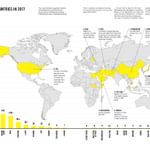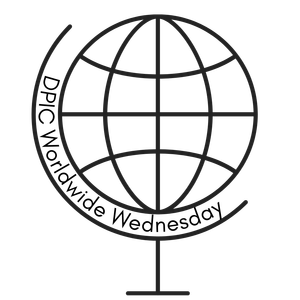
Use of the death penalty declined worldwide in 2017, according to the Amnesty International’s annual global report on capital punishment.
The human rights organization recorded 2,591 death sentences imposed in 53 countries in 2017, down 17% from the 3,117 death sentences it recorded from 55 countries in 2016. Executions also fell, with 23 nations carrying out a recorded 993 executions, off 4% from the 1,032 executions recorded in 2016 and 39% below the 1,634 executions reported in 2015.
Two more countries — Guinea and Mongolia — abolished capital punishment, increasing the number of abolitionist nations to 106, and Guatemala outlawed executions for “ordinary crimes” such as murder, bringing to 142 the number of nations Amnesty reports as having “abolished the death penalty in law or practice.”
As in previous years, Amnesty’s execution total does not include the estimated thousands of executions carried out in China or executions in North Korea and Vietnam, all of which treat information on the death penalty as a state secret. Four countries — Iran, Saudi Arabia, Iraq, and Pakistan — which collectively accounted for 87% of the confirmed executions in the rest of the world in 2016, accounted for 84% of the world’s confirmed executions in 2017.
The United States dropped to 8th in documented executions (23) in 2017 and ranked 11th in death sentences imposed. For the 9th consecutive year, it was the only country in the Americas to carry out executions.

Among human rights violations, Amnesty reported that 15 countries imposed death sentences or executed people for drug-trade related offenses, with China, Iran, Saudi Arabia, and Singapore executing prisoners for involvement in the drug trade. The secrecy practices in Malaysia and Vietnam prevented Amnesty from determining whether similar human rights violations had occurred in those countries.
“Despite strides towards abolishing this abhorrent punishment, there are still a few leaders who would resort to the death penalty as a ‘quick-fix’ rather than tackling problems at their roots with humane, effective and evidence-based policies,” said Amnesty’s Secretary General Salil Shetty. “The draconian anti-drug measures widely used in the Middle East and Asia-Pacific have totally failed to address the issue.”
Amnesty also cited Iran for violating the human rights proscription against applying the death penalty to prisoners charged with offenses committed when they were younger than age 18. Iran executed five juvenile offenders in 2017, and has at least 80 others remaining on death row.
Amnesty said Japan, the Maldives, Pakistan, Singapore, and the United States violated the international prohibition on executing prisoners with mental or intellectual disabilities or keeping such prisoners under sentence of death. Amnesty reported that at least 21,919 people were known to be on death rows around the world at the end of 2017.
Amnesty International, Global Report: Death Sentences and Executions 2017, released April 12, 2018; Amnesty International, Web Summary: Death Sentences and Executions 2017, April 12, 2018; Amnesty International, The Death Penalty in 2017: Facts and Figures, April 12, 2018.
See International.
Mental Illness
Dec 17, 2024
Indiana’s First Execution in 15 Years Raises Serious Constitutional Concerns
International
Oct 11, 2024

